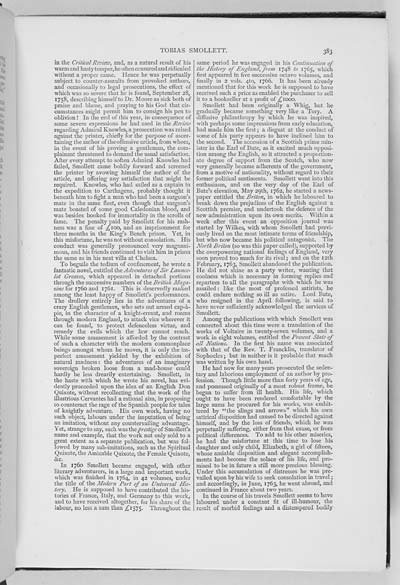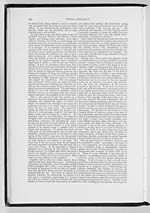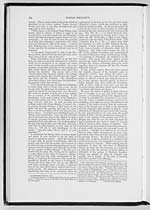Volume 3 > Half-Volume 6
(29) Page 383
Download files
Individual page:
Thumbnail gallery: Grid view | List view

383 in the Critical Review, and, as a natural result of his warm and hasty temper, he often censured and ridiculed without a proper cause. Hence he was perpetually subject to counter-assaults from provoked authors, and occasionally to legal prosecutions, the effect of which was so severe that he is found, September 28, 1758, describing himself to Dr. Moore as sick both of praise and blame, and praying to his God that cir- cumstances might permit him to consign his pen to oblivion! In the end of this year, in consequence of some severe expressions he had used in the Review regarding Admiral Knowles, a prosecution was raised against the printer, chiefly for the purpose of ascer- taining the author of the offensive article, from whom, in the event of his proving a gentleman, the com- plainant threatened to demand the usual satisfaction. After every attempt to soften Admiral Knowles had failed, Smollett came boldly forward and screened the printer by avowing himself the author of the article, and offering any satisfaction that might be required. Knowles, who had sailed as a captain in the expedition to Carthagena, probably thought it beneath him to fight a man who had been a surgeon's mate in the same fleet, even though that surgeon's mate boasted of some good Caledonian blood, and was besides booked for immortality in the scrolls of fame. The penalty paid by Smollett for his rash- ness was a fine of ,�100, and an imprisonment for three months in the King's Bench prison. Yet, in this misfortune, he was not without consolation. His conduct was generally pronounced very magnani- mous, and his friends continued to visit him in prison the same as in his neat villa at Chelsea. To beguile the tedium of confinement, he wrote a fantastic novel, entitled the Adventures of Sir Launce- lot Greaves, which appeared in detached portions through the successive numbers of the British Maga- zine for 1760 and 1761. This is deservedly ranked among the least happy of Smollett's performances. The drollery entirely lies in the adventures of a crazy English gentleman, who sets out armed cap-a- pie, in the character of a knight-errant, and roams through modern England, to attack vice wherever it can be found, to protect defenceless virtue, and remedy the evils which the law cannot reach. While some amusement is afforded by the contrast of such a character with the modern commonplace beings amongst whom he moves, it is only the im- perfect amusement yielded by the exhibition of natural madness: the adventures of an imaginary sovereign broken loose from a mad-house could hardly be less drearily entertaining. Smollett, in the haste with which he wrote his novel, has evi- dently proceeded upon the idea of an English Don Quixote, without recollecting that the work of the illustrious Cervantes had a rational aim, in proposing to counteract the rage of the Spanish people for tales of knightly adventure. His own work, having no such object, labours under the imputation of being an imitation, without any countervailing advantage. Yet, strange to say, such was the prestige of Smollett's name and example, that the work not only sold to a great extent as a separate publication, but was fol- lowed by many sub-imitations, such as the Spiritual Quixote, the Amicable Quixote, the Female Quixote, &c. In 1760 Smollett became engaged, with other literary adventurers, in a large and important work, which was finished in 1764, in 42 volumes, under the title of the Modern Part of an Universal His- tory. He is supposed to have contributed the his- tories of France, Italy, and Germany to this work, and to have received altogether, for his share of the labour, no less a sum than �1575. Throughout the same period he was engaged in his Continuation of the History of England, from 1748 to 1765, which first appeared in five successive octavo volumes, and finally in 2 vols. 4to, 1766. It has been already mentioned that for this work he is supposed to have received such a price as enabled the purchaser to sell it to a bookseller at a profit of �1000. Smollett had been originally a Whig, but he gradually became something very like a Tory. A diffusive philanthropy by which he was inspired, with perhaps some impressions from early education, had made him the first; a disgust at the conduct of some of his party appears to have inclined him to the second. The accession of a Scottish prime min- ister in the Earl of Bute, as it excited much opposi- tion among the English, so it attracted a proportion- ate degree of support from the Scotch, who now very generally became adherents of the government, from a motive of nationality, without regard to their former political sentiments. Smollett went into this enthusiasm, and on the very day of the Earl of Bute's elevation, May 29th, 1762, he started a news- paper entitled the Briton, in which he laboured to break down the prejudices of the English against a Scottish premier, and undertook the defence of the new administration upon its own merits. Within a week after this event an opposition journal was started by Wilkes, with whom Smollett had previ- ously lived on the most intimate terms of friendship, but who now became his political antagonist. The North Briton (so was this paper called), supported by the overpowering national feelings of England, very soon proved too much for its rival; and on the 12th February, 1763, Smollett abandoned the publication. He did not shine as a party writer, wanting that coolness which is necessary in forming replies and repartees to all the paragraphs with which he was assailed: like the most of professed satirists, he could endure nothing so ill as satire. Lord Bute, who resigned in the April following, is said to have never sufficiently acknowledged the services of Smollett. Among the publications with which Smollett was connected about this time were a translation of the works of Voltaire in twenty-seven volumes, and a work in eight volumes, entitled the Present State of all Nations, In the first his name was associated with that of the Rev. T. Francklin, translator of Sophocles; but in neither is it probable that much was written by his own hand. He had now for many years prosecuted the seden- tary and laborious employment of an author by pro- fession. Though little more than forty years of age, and possessed originally of a most robust frame, he began to suffer from ill health. His life, which ought to have been rendered comfortable by the large sums he procured for his works, was embit- tered by "the slings and arrows" which his own satirical disposition had caused to be directed against himself, and by the loss of friends, which he was perpetually suffering, either from that cause, or from political differences. To add to his other miseries, he had the misfortune at this time to lose his daughter and only child, Elizabeth, a girl of fifteen, whose amiable disposition and elegant accomplish- ments had become the solace of his life, and pro- mised to be in future a still more precious blessing. Under this accumulation of distresses he was pre- vailed upon by his wife to seek consolation in travel; and accordingly, in June, 1763, he went abroad, and continued in France about two years. In the course of his travels Smollett seems to have laboured under a constant fit of ill-humour, the result of morbid feelings and a distempered bodily
Set display mode to:
![]() Universal Viewer |
Universal Viewer | ![]() Mirador |
Large image | Transcription
Mirador |
Large image | Transcription
Images and transcriptions on this page, including medium image downloads, may be used under the Creative Commons Attribution 4.0 International Licence unless otherwise stated. ![]()
| Biographical dictionary of eminent Scotsmen > Volume 3 > Half-Volume 6 > (29) Page 383 |
|---|
| Permanent URL | https://digital.nls.uk/74514332 |
|---|---|
| Attribution and copyright: |
|
| Description | Volume III. Contains names alphabetically from Macadam to Young. |
|---|

